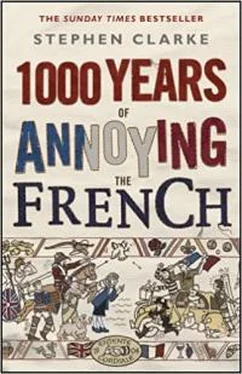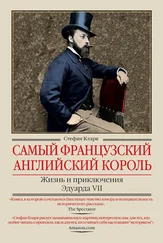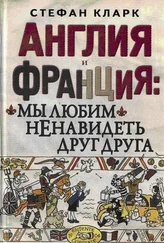Стефан Кларк - 1000 Years of Annoying the French
Здесь есть возможность читать онлайн «Стефан Кларк - 1000 Years of Annoying the French» весь текст электронной книги совершенно бесплатно (целиком полную версию без сокращений). В некоторых случаях можно слушать аудио, скачать через торрент в формате fb2 и присутствует краткое содержание. ISBN: , Издательство: Transworld Digital, Жанр: Старинная литература, на английском языке. Описание произведения, (предисловие) а так же отзывы посетителей доступны на портале библиотеки ЛибКат.
- Название:1000 Years of Annoying the French
- Автор:
- Издательство:Transworld Digital
- Жанр:
- Год:неизвестен
- ISBN:9781407067629
- Рейтинг книги:3 / 5. Голосов: 1
-
Избранное:Добавить в избранное
- Отзывы:
-
Ваша оценка:
- 60
- 1
- 2
- 3
- 4
- 5
1000 Years of Annoying the French: краткое содержание, описание и аннотация
Предлагаем к чтению аннотацию, описание, краткое содержание или предисловие (зависит от того, что написал сам автор книги «1000 Years of Annoying the French»). Если вы не нашли необходимую информацию о книге — напишите в комментариях, мы постараемся отыскать её.
1000 Years of Annoying the French — читать онлайн бесплатно полную книгу (весь текст) целиком
Ниже представлен текст книги, разбитый по страницам. Система сохранения места последней прочитанной страницы, позволяет с удобством читать онлайн бесплатно книгу «1000 Years of Annoying the French», без необходимости каждый раз заново искать на чём Вы остановились. Поставьте закладку, и сможете в любой момент перейти на страницу, на которой закончили чтение.
Интервал:
Закладка:
Thomas was so sure of himself that he even provoked his own murder. Initially, Henry’s knights entered the cathedral unarmed, and simply wanted the archbishop to come with them and explain himself to King Henry. It was only when Thomas told them to go and get knighted that they went outside again to fetch their swords.
In short, if Thomas Becket hadn’t spent two years learning the art of French petulance, he might have died in bed and Henry II might be remembered only as one of England’s greatest kings rather than a priest-killer.
In fact, the murder was to cost Henry more than his reputation – it was one of the things that caused his ultimate downfall.
He and Eleanor had eight children, including five sons. But their relations were famously strained. Both were dynastically minded, and they were constantly jostling for position within their joint empire. Eleanor seems to have encouraged her native Aquitaine to remain independent of King Henry’s authority, while Henry attacked cities like Toulouse that already belonged to Eleanor’s family. Eleanor was piqued even more by the decidedly unmonkish Henry’s infidelities, including a liaison with his own son Richard’s fiancée. And although she usually turned a blind eye to his philandering, Eleanor refused to ignore Rosamund Clifford, the beautiful young mistress whom Henry dubbed ‘rosa mundi’ (the ‘rose of the world’); as soon as Rosamund arrived on the scene, Eleanor’s child-bearing stopped.
It is said that by flaunting this relationship, Henry was trying to goad Eleanor into annulling their marriage, in which case he would have made her an abbess and inherited all her lands. But not only did she resist the provocation, she actively encouraged Henry’s own sons to begin hacking away at his empire with their princely swords.
Suddenly, the King of England was under attack from France – by his own sons. The biggest troublemaker was his second son (but the oldest surviving one), who was also called Henry. The Young King, as he was known, bore an old grudge against his father. He had spent most of his childhood as the foster son of Thomas Becket, and is said to have declared that Thomas showed him more fatherly affection in a day than King Henry had in a lifetime – he was therefore mightily upset about Becket’s murder.
Young Henry was married to Marguerite de France, the daughter of King Louis VII by a second marriage. This union had been a tactical move by Henry II to increase his influence in France, but now rebounded on him, because in 1173 Young Henry went to live with Louis (who was also, remember, his mother’s ex-husband) in Paris, where he began to plot a rebellion.
At first, he was helped by his mother Eleanor, who was based in Aquitaine at the time. She sent two of her younger sons, Richard (the future Lionheart) and Geoffrey, to join the plotters, and would have gone to Paris herself if Henry (that’s her husband, King Henry II) hadn’t objected to this dubious reunion with her ex-husband and had her taken prisoner.
The French-led revolt went ahead, with Louis and Young Henry storming Normandy from the south, while various French counts attacked from the east. King Henry II, though, had come prepared. Instead of relying on the fragile loyalty of all the noblemen in his vast domains, he had hired a mercenary army of so-called Brabançons – fierce, unconventional fighters originally from Brabant on the Dutch–Belgian border, who had been used by King Stephen in England to inflict some of the worst atrocities of the Anarchy. They trounced the French attackers and sent the surviving rebels skulking back to Paris, where the weak Louis VII announced that he had had enough of all this messy rebelling.
But Henry II’s success was short-lived. He had such a great empire, and so many eligible, ambitious sons, that he became like the ageing lion at the head of a pride – the young males were forever snapping at his heels, looking for signs of weakness, and were encouraged in this by the senior lioness, Eleanor. Both Young Henry and Richard kept up their demands for land, squabbling all the while between themselves about who was going to inherit what, and King Henry II was doomed to watch his family disintegrate.
Young Henry died of dysentery after a failed attempt to take another of his father’s possessions, the town of Limoges in central France. Soon afterwards, his brother Geoffrey, who had taken permanent refuge in Paris after the failed revolt, was killed there in a jousting tournament.
Only John remained faithful and by his father’s side, although he wasn’t much of a consolation – in the end, it was John who finished Henry off.
In the summer of 1189, Richard heard that his father wanted to give Aquitaine to John. Furious at the idea of losing such a profitable chunk of his rightful inheritance as the oldest surviving son, Richard launched yet another of his patricidal rebellions in Anjou. And this time he found the only true chink in Henry’s armour – he persuaded young John to betray his father.
Henry II’s chaplain, a Welsh-Norman chronicler called Gerald of Wales, describes a painting in one of the rooms at the royal castle of Winchester. It depicted an eagle being pecked by three chicks, while another, smaller one looked on. And when asked the meaning of the bizarre scene, Henry is said to have explained that the chicks were his four sons, and that the youngest ‘whom I now hold in dear affection, will one day cause me more grievous and more mortal pain than all the others’. Whether this is a true story or a parable after the event, it was now chillingly apt.
Henry went out to Anjou to defend himself, but Richard and his allies (who included Louis VII’s son, Philippe Auguste) were running rampant, and Henry eventually decided to give in to all their demands. In any case, by now John’s betrayal had almost broken the old King’s heart.
Mere days after giving in to his sons and their French allies, Henry II died at Chinon Castle (where he had once imprisoned his wife Eleanor) on 6 July 1189. It is said that he died of grief, and that when Richard rather hypocritically came to pay his respects to the body, Henry’s nose started to bleed, as if to show his errant son how many headaches he had caused.
Not that Richard was the emotional type – he had himself crowned Duke of Normandy, and then headed straight to London to be enthroned as King of England.
For sale: one capital city, full of antiques
Richard I (the Lionheart) is remembered as a great English king, but in fact he spent only seven months of his ten-year reign in the country he was supposed to be ruling. He preferred to rampage abroad, and was usually to be found defending the inhabitants of the Eastern Mediterranean against any kind of religious freedom they might aspire to, or kicking potential usurpers out of the immense French landholdings that he inherited from his parents – Richard was not only King of England but also Duke of Normandy, Aquitaine and Gascony, Count of Anjou and Nantes, and Lord of Brittany.
He held little affection for England, and even said that he would have ‘sold London if he could have found a buyer’, to pay for his crusades.
It was while Richard was off crusading that his younger brother John continued the family tradition of anti-sibling plotting, thereby making himself the villain of countless Robin Hood films, along with his co-baddie the Sheriff of Nottingham. Or so legend would have us believe. Because despite the assurances of tourist boards everywhere from Hadrian’s Wall to Wiltshire, it seems unlikely that Robin Hood ever existed. Or, at least, that the one-and-only Robin Hood as we know him existed – it was a very common name in the Middle Ages, Robin being a diminutive of Robert and Hood an alternative version of Wood. Robin Hood may also have been a collective term for outlaws that had been inspired by a real case, just as the word ‘hooligan’ comes from Houlihan, the name of a disreputable family in 1890s London.
Читать дальшеИнтервал:
Закладка:
Похожие книги на «1000 Years of Annoying the French»
Представляем Вашему вниманию похожие книги на «1000 Years of Annoying the French» списком для выбора. Мы отобрали схожую по названию и смыслу литературу в надежде предоставить читателям больше вариантов отыскать новые, интересные, ещё непрочитанные произведения.
Обсуждение, отзывы о книге «1000 Years of Annoying the French» и просто собственные мнения читателей. Оставьте ваши комментарии, напишите, что Вы думаете о произведении, его смысле или главных героях. Укажите что конкретно понравилось, а что нет, и почему Вы так считаете.












